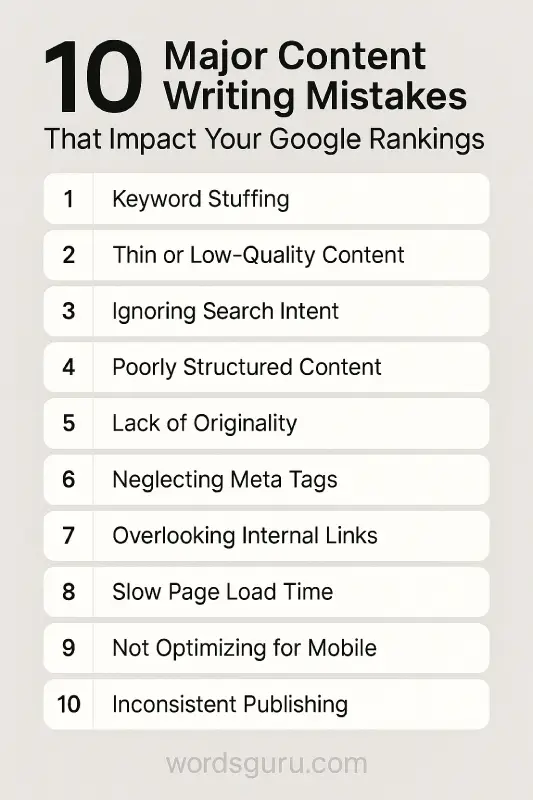Struggling to rank on Google despite publishing content regularly? You are not alone! There is probably something wrong with your content that you cannot see. These issues can considerably affect your Google ranking, organic traffic, and lead-generation costs. So what are these mistakes? In this blog, we will explore the 10 most common content writing mistakes to avoid in your content with tips to fix the mistakes and improve visibility and performance.
Common Writing Pitfalls That Lower Search Performance
1. Poor Keyword Strategy
Mistake: Assuming keywords or not researching.
Solution: Use Google Keyword Planner, SEMrush, or Ahrefs so you know what your audience is searching for. Target long-tail keywords that express search intent and have less competition. Ensure every piece of content has data behind it and not assumptions.
2. Messy Heading Structure
Mistake: Using inconsistent, unclear headings and no structure.
Solution: Use clear headings with a hierarchy in mind. H1 for the title, H2 for the main section, and H3 for an additional describing section. This will allow users to experience better usability, with readability and crawlability.
3. Weak or Generic Content
Mistake: Writing and publishing repurposed content without adding any original or creative perspectives.
Solution: Generate content that delivers value. Include organized descriptions, numbers, and industry data.
4. Missing or Poor Meta Titles & Descriptions
Mistake: Duplicate, autogenerated, or uninspiring meta titles and descriptions.
Solution: Replace them with a distinct meta title & description for each page containing the target keywords. Be creative, but not overstated, and be accurate in the information that you present to the user.
5. Keyword Stuffing
Mistake: Using the keyword so often that the content sounds robotic and unnatural.
Solution: Write for people, not just for search engines. Use target keywords, relevant terms, or variations in a natural way to help on-page SEO by repeating the keywords not too much.
6. Lack of Originality
Mistake: Whether directly copying someone else’s ideas or being overly reliant on AI.
Solution: Avoid copying or summarizing someone else’s content without creating something unique. Share your opinions and stories from experts. Use AI to assist, but not as a replacement.
7. Forgetting Internal Links
Mistake: You are not linking your content to other relevant pages on your site.
Solution: Build contextual internal links with appropriate anchor text. This enhances on-page SEO, increases engagement, and helps users be directed to related topics.
8. Ignoring Search Intent
Mistake: Writing about what you think is relevant instead of the intent of what the visitor is searching for.
Solution: Don’t just understand a user’s query; understand their intent. Utilize Google Search Console to check exact queries and to tailor your content accordingly.
9. Ignoring Mobile Friendliness and Readability
Mistake: Avoid Publishing blocks of text or layouts that have zero value on mobile devices and are unreadable.
Solution: Break content into short paragraphs and bullet points, and utilize responsive design. Use an Application such as Hemingway Editor to break each paragraph down and improve readability to make it as easy as possible.
10. Forgetting Calls-to-Action (CTAs)
Mistake: Ending your content on a non-engaging dead end and not giving the user a clearly defined next step.
Solution: Always end with the call to action, whether that is a newsletter sign-up, next step download PDF, contact the team, or read another blog. A Call to action provides an opportunity for user engagement and value for the company, and will also improve behavioral signals that will positively impact your Google rankings.
Final Thoughts
Google rewards accuracy, not effort.
In order for your content to rank on Google, it has to do more than inform; it has to serve a purpose and be representative of what the user is actually searching for. By avoiding the above content writing mistakes, you can rank better and reach more users while also using your content as an actual channel for growth.
At WordsGuru, we help brands, marketers, and agencies develop quality SEO-optimized content that is built to rank for and ultimately convert. Whether you want content strategy or writing help, anything that relates to content, we can assist, all while following Google’s algorithm changes and the user’s search practices.
📩 Need expert content that performs?
Email us at info@wordsguru.com or visit www.wordsguru.com to get started.

